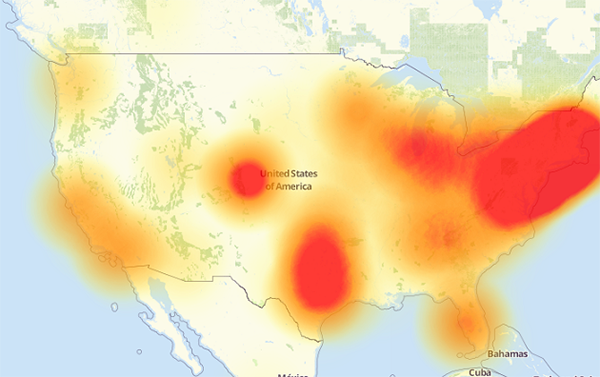Joey DeVilla provides a convenient layman’s terms description of last Friday’s denial of service attacks on Dyn:
A map of the parts of the internet affected by Friday’s attack. The redder an area is, the more heavily it was affected.
If you’ve been reading about the cyberattack that took place last Friday and are confused by the jargon and technobabble, this primer was written for you! By the end of this article, you’ll have a better understanding of what happened, what caused it, and what can be done to prevent similar problems in the future.
[…]
On Friday, October 21, 2016 at around 6:00 a.m. EDT, a botnet made up of what could be up to tens of millions of machines — a large number of which were IoT devices — mounted a denial-of-service attack on Dyn, disrupting DNS over a large part of the internet in the U.S.. This in turn led to a large internet outage on the U.S. east coast, slowing down the internet for many users and rendered a number of big sites inaccessible, including Amazon, Netflix, Reddit, Spotify, Tumblr, and Twitter.
Flashpoint, a firm that detects and mitigates online threats, was the first to announce that the attack was carried out by a botnet of compromised IoT devices controlled by Mirai malware. Dyn later corroborated Flashpoint’s claim, stating that their servers were under attack from devices located at millions of IP addresses.
The animation above is a visualization of the attack based on the devices’ IP addresses and IP geolocation (a means of approximating the geographic location of an IP address; for more, see this explanation on Stack Overflow). Note that the majority of the devices were at IP addresses (and therefore, geographic locations) outside the United States.



 The NFL’s last unbeaten team has faceplanted, allowing the surviving members of the 1972 Miami Dolphins to pop the champagne one more time (I doubt that any of them actually follow this tradition, but it’s a sports writer’s meme that just won’t die). As a football game, Sunday’s match between the Vikings and the Eagles was painful to watch for fans of either team, as the turnover bug bit hard and repeatedly. “How bad was the game?”, I pretend to hear you ask. It was literally this bad:
The NFL’s last unbeaten team has faceplanted, allowing the surviving members of the 1972 Miami Dolphins to pop the champagne one more time (I doubt that any of them actually follow this tradition, but it’s a sports writer’s meme that just won’t die). As a football game, Sunday’s match between the Vikings and the Eagles was painful to watch for fans of either team, as the turnover bug bit hard and repeatedly. “How bad was the game?”, I pretend to hear you ask. It was literally this bad:

